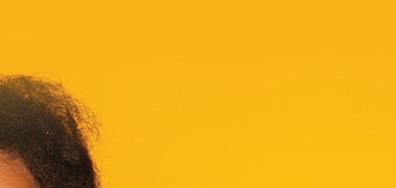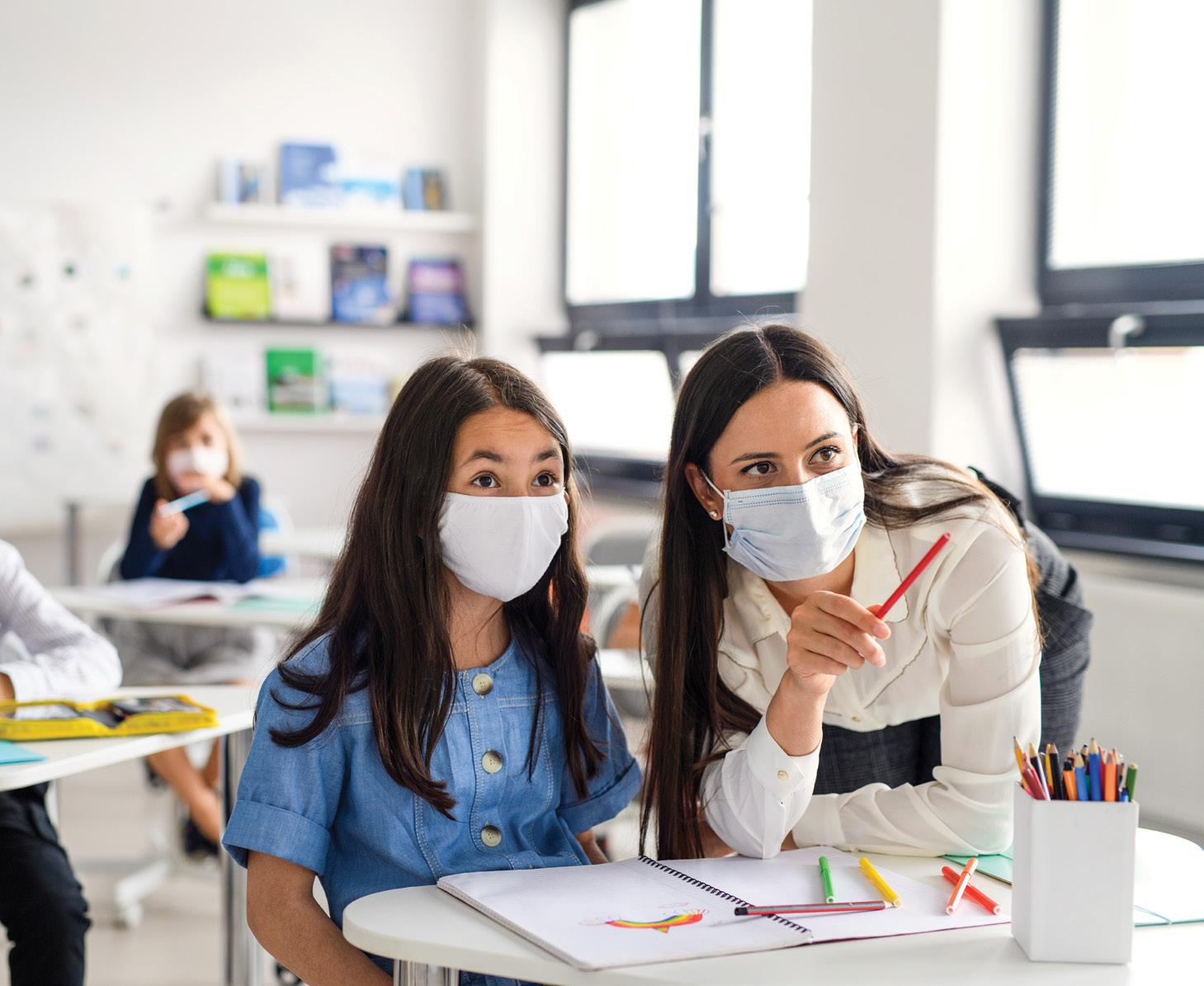
21 minute read
THE CURSE OF KNOWLEDGE
THE CURSE OF THE CURSE OF KNOWLEDGE KNOWLEDGE

Advertisement
Adam Boxer explains why our novice students don’t Adam Boxer explains why our novice students don’t always understand our explanations as much as we always understand our explanations as much as we think they should. It’s because we’ve forgotten how think they should. It’s because we’ve forgotten how expert we’ve become. expert we’ve become.


By Adam Boxer By Adam Boxer
I want you to try something out for me: I want you to try something out for me: must be like to not have that knowledge. must be like to not have that knowledge. It just can’t be done. We repeatedly fail It just can’t be done. We repeatedly fail 1. Think of a tune in your head.1. Think of a tune in your head. to truly appreciate what “not having that knowledge” is like. The failure to to truly appreciate what “not having that knowledge” is like. The failure to 2. 2. Find a friend. Find a friend. appreciate the gap between our knowledge and their knowledge is called “the curse of knowledge” or “expert blindness.” appreciate the gap between our knowledge and their knowledge is called “the curse of knowledge” or “expert blindness.” 3. You are the “tapper” and your friend is 3. You are the “tapper” and your friend is As teachers, we specialise in this area – it’s As teachers, we specialise in this area – it’s the “listener”. the “listener”. literally our job to take knowledge that literally our job to take knowledge that we have and others don’t and pass it on we have and others don’t and pass it on 4. On a table, tap out your tune without 4. On a table, tap out your tune without to them. Most of the time, I think we get this right. We know that when it comes to to them. Most of the time, I think we get this right. We know that when it comes to humming or singing or anything. humming or singing or anything. really tricky concepts we have to work as really tricky concepts we have to work as hard as we can to cut the ideas up, simplify hard as we can to cut the ideas up, simplify 5. Before you ask your friend to guess what the tune is, try and predict the likelihood of them getting it right. 5. Before you ask your friend to guess what the tune is, try and predict the likelihood of them getting it right. them and make them readily intelligible. I do, however, think there are two common areas that we don’t get right. them and make them readily intelligible. I do, however, think there are two common areas that we don’t get right. 6. Ask them what the tune is.6. Ask them what the tune is. First, is in the obviously interesting way we think and talk about our subjects. To us, First, is in the obviously interesting way we think and talk about our subjects. To us, they are a huge part not just of what we do, they are a huge part not just of what we do, In 1990, Dr Elizabeth Newton tried this In 1990, Dr Elizabeth Newton tried this but they are a part of what we are. We love but they are a part of what we are. We love out for real. Using tappers and listeners, out for real. Using tappers and listeners, our subjects and obsess over them in all our subjects and obsess over them in all she found that only 2 in 150 tunes were she found that only 2 in 150 tunes were of their nerdy gloriousness. Our students, of their nerdy gloriousness. Our students, correctly guessed by listeners, but tappers correctly guessed by listeners, but tappers however, do not. And whilst sometimes however, do not. And whilst sometimes predicted that listeners would get it right predicted that listeners would get it right your tangents and meanders might be your tangents and meanders might be around 50% of the time. As such, if your around 50% of the time. As such, if your endearing, they aren’t always what your endearing, they aren’t always what your listener got it right, I’ll donate a tenner to listener got it right, I’ll donate a tenner to students want to hear. Don’t get me wrong: students want to hear. Don’t get me wrong: a charity of your choice. a charity of your choice. they are important and valuable and a part they are important and valuable and a part of what makes teaching brilliant, but don’t of what makes teaching brilliant, but don’t This, and other experiments, teach us This, and other experiments, teach us forget that most of your students aren’t as forget that most of your students aren’t as something about the relationship between something about the relationship between desperately in love with the subject as you desperately in love with the subject as you our knowledge and others’ knowledge. our knowledge and others’ knowledge. are – it’s why only 1.2% of the UK working are – it’s why only 1.2% of the UK working When we have something in our head When we have something in our head population are teachers. So yes, show your population are teachers. So yes, show your that is clear and obvious it is a biological that is clear and obvious it is a biological passion and your interest, but don’t get passion and your interest, but don’t get impossibility for us to imagine what it impossibility for us to imagine what it carried away. carried away.







The small number of The small number of students who struggle to students who struggle to access your own in-class access your own in-class explanations are likely to explanations are likely to be the same ones who need be the same ones who need the most support across the the most support across the curriculum. curriculum.

The other area occurred to me recently when watching a History lesson on Lenin and the Russian Civil War. At one point, the teacher was talking about “propaganda” and explained really nicely what the term meant, but then straight after didn’t adequately explain what the word “opposition” meant. I wondered how many of those Year 8 students struggled to have a clear concept of what the word “opposition” meant, and though I haven’t done any kind of research I suspect it’s sizeable. The small number of students who struggle to access your own in-class explanations are likely to be the same ones who need the most support across the curriculum.

I started listening out for words and phrases like this during the lesson and jotted down a list: These words are probably what we call “Tier 2” vocabulary in a three tier system. Tier 1 words are common words that almost everybody knows and you don’t need to teach; like “picture”, “list” or “happy.” Tier 3 words are technical, domain-specifi c vocabulary like “photosynthesis,” “iambic” or “longshore drift.” Teachers are conscious of these words that constitute the foundational grammar and discourse of our subjects and we normally teach them explicitly and deliberately.

Where things are less certain are Tier 2 words, words which sort of bridge the gap. They are high level, but not necessarily context dependent. Words like: “ecstatic”, “numerate” or “redundant” might be good words here. Teachers, being well-educated and sophisticated users of language, use Tier 2 words frequently and with ease. Our students, however, might not. Though we are careful and deliberate with our use of Tier 3 words, the very substance of our subjects, we are often cursed and blinded by our knowledge when it comes to using words in Tier 2.
So, try to be aware of the language you use and how accessible it is. We should certainly continue to use Tier 2 language as we induct our students into intellectual and academic rigour, but we may occasionally need to slow the pace and teach those words explicitly in much the same way that we would for more technical and domain-specifi c language.
Oh, and I’m keeping my tenner.




We work tirelessly to change the lives of those affected by bullying and we know we make a difference. We see it in the way young people engage in our projects, how we empower them to Make a Difference and how they develop confidence and learn new skills.
By developing a positive ethos across a whole school/organisation community, we can create an environment that meets the emotional, academic and social needs of pupils and staff. Creating an anti-bullying and respectful ethos is a powerful way to Inspire Change.
Our Youth Ambassadors are a dynamic team of young volunteers working together to help deal with the issue of bullying. They are committed and dedicated and all have a passion to Make A Difference in their local communities. The programme is open all year round and you can join wherever you live and whatever your background and interests are.

FEATURE BACK TO SCHOOL BACK TO BASICS


Sam Strickland reminds us not to get caught up with the catch up narrative when schools open fully in March. Trust the teachers. Keep it simple.
By Sam Strickland



Friday 20th March 2020 could be viewed as education’s ‘Day of Infamy.’ Since schools were o cially cited as ‘closed’, education has been forced to Friday 20th March 2020 could be viewed as education’s ‘Day of Infamy.’ Since schools were o cially cited as ‘closed’, education has been forced to adapt in a way no one could have foreseen, adapt in a way no one could have foreseen, bringing about an emphatic array of changes. bringing about an emphatic array of changes. It is too early to say if education has changed It is too early to say if education has changed for the better or whether we are going to see for the better or whether we are going to see a di erence in our approach and philosophy a di erence in our approach and philosophy in the long term. What is absolutely in the long term. What is absolutely certain is that the teaching profession has certain is that the teaching profession has demonstrated enormous professional agility demonstrated enormous professional agility and managed to change its modus operandi and managed to change its modus operandi on the turn of a sixpence. on the turn of a sixpence. In the last year, schools have had to both In the last year, schools have had to both juggle and spin multiple plates. From the juggle and spin multiple plates. From the outset, schools were described as ‘closed,’ but outset, schools were described as ‘closed,’ but they were anything but closed. Key worker they were anything but closed. Key worker and vulnerable pupil provision has become and vulnerable pupil provision has become a daily norm, with the numbers from school a daily norm, with the numbers from school ‘closure’ one, to ‘closure’ two dramatically ‘closure’ one, to ‘closure’ two dramatically increasing as the criteria became far more increasing as the criteria became far more woolly and loose. Teachers have had to woolly and loose. Teachers have had to consider how to teach pupils remotely. consider how to teach pupils remotely. The debates over live versus pre-recorded The debates over live versus pre-recorded lessons, plus what we even mean by ‘remote lessons, plus what we even mean by ‘remote learning’ has not only ensued but has learning’ has not only ensued but has become a game of political brinkmanship. become a game of political brinkmanship. Schools had to devise Centre Assessed Schools had to devise Centre Assessed Grades in anticipation of last summer’s Grades in anticipation of last summer’s examination result days. At fi rst it looked examination result days. At fi rst it looked like these grades were something of a waste like these grades were something of a waste of time, with preference for an algorithm. of time, with preference for an algorithm. But that ultimately led to a U-Turn, which But that ultimately led to a U-Turn, which was not only inevitable and obvious but also was not only inevitable and obvious but also damaging. damaging. Schools then had to widen their already Schools then had to widen their already open doors in the summer term, welcoming open doors in the summer term, welcoming back their pupils, with a view that it would back their pupils, with a view that it would be business as usual come September. The be business as usual come September. The reality, once the new academic year began, reality, once the new academic year began, was that it was anything but business as was that it was anything but business as usual. Schools implemented and embedded usual. Schools implemented and embedded highly-refi ned Covid-19 secure safety highly-refi ned Covid-19 secure safety measures and managed to navigate their measures and managed to navigate their way for the fi rst few weeks of the academic way for the fi rst few weeks of the academic year. However, the invisible foe was always year. However, the invisible foe was always waiting in the wings. waiting in the wings. Every Head, if they are fully honest, knew Every Head, if they are fully honest, knew that disruption within their schools was that disruption within their schools was unavoidable: that bubbles would burst and unavoidable: that bubbles would burst and that classes, year groups and sta would that classes, year groups and sta would need to be sent home. There was also an air need to be sent home. There was also an air of inevitability from the outset that exams in of inevitability from the outset that exams in the summer of 2021 were unlikely to happen the summer of 2021 were unlikely to happen either and I fi nd it ba ing that a credible either and I fi nd it ba ing that a credible and tangible Plan B was not considered and and tangible Plan B was not considered and ready to go in the highly likely event of all ready to go in the highly likely event of all schools nationally having to ‘close’ once schools nationally having to ‘close’ once more. more.
From the outset, schools From the outset, schools were described as were described as ‘closed,’ but they were ‘closed,’ but they were anything but closed. anything but closed.


What pupils do not What pupils do not need when schools need when schools open their doors more open their doors more widely is to be greeted widely is to be greeted by a wave of panic. by a wave of panic.
What we now face as a sector is What we now face as a sector is uncertainty. Anyone who knows anything uncertainty. Anyone who knows anything about education, about schools, about about education, about schools, about sta , about children and about parents sta , about children and about parents is that uncertainty does not go down is that uncertainty does not go down well. If you run a school with uncertainty well. If you run a school with uncertainty surrounding your values, expectations surrounding your values, expectations and rules then you normally get chaos. and rules then you normally get chaos. What we need, swiftly, is precision, What we need, swiftly, is precision, clarity and certainty. At the time of clarity and certainty. At the time of writing this article there is still no real writing this article there is still no real sense regarding how pupils in Years 6, sense regarding how pupils in Years 6, 11 and 13 will be assessed and awarded 11 and 13 will be assessed and awarded grades this summer. No one truly grades this summer. No one truly knows what will happen with Year 5 knows what will happen with Year 5 and their SATs in 2022. Year 10 have and their SATs in 2022. Year 10 have now missed more than a signifi cant now missed more than a signifi cant chunk of their GCSE content, often with chunk of their GCSE content, often with multiple disruptions due to periods of multiple disruptions due to periods of self-isolation as well as closure. Year self-isolation as well as closure. Year 12 pupils have never sat a formal set of 12 pupils have never sat a formal set of exams and missed a huge chunk of their exams and missed a huge chunk of their Post-16 experience. In what will feel like Post-16 experience. In what will feel like the blink of an eye, our eldest pupils in the blink of an eye, our eldest pupils in the schooling system will sit a public the schooling system will sit a public examination series for the fi rst time ever. examination series for the fi rst time ever. The stakes for those pupils could not be The stakes for those pupils could not be higher. higher. The narrative has now shifted to one of The narrative has now shifted to one of catch-up, intervention, extended school catch-up, intervention, extended school days, extending the school year and days, extending the school year and extra-tutoring for pupils. Whether this extra-tutoring for pupils. Whether this is motivated by political football or a is motivated by political football or a strong sense of moral purpose is broadly strong sense of moral purpose is broadly speaking irrelevant to the people on speaking irrelevant to the people on the ground and to the pupils who will the ground and to the pupils who will experience an inevitable tidal wave of experience an inevitable tidal wave of extra intervention to ‘catch up.’ extra intervention to ‘catch up.’ What is relevant, however, is that we What is relevant, however, is that we must carefully consider why we are must carefully consider why we are doing something and what we want to doing something and what we want to achieve by doing so. The words impact, achieve by doing so. The words impact, progress and intervention are all too progress and intervention are all too readily used in education and often readily used in education and often carry little meaning or yield dangerous carry little meaning or yield dangerous mutations. Most notably, when I think mutations. Most notably, when I think about intervention my mind is fi lled about intervention my mind is fi lled with images of red, amber and green with images of red, amber and green coloured trackers and measuring how coloured trackers and measuring how much progress di erent cohorts of much progress di erent cohorts of pupils are making from one period of pupils are making from one period of time to the next. There is a real danger time to the next. There is a real danger that we are going to forget what both that we are going to forget what both the research and our own professional the research and our own professional experiences have shown us. We need to experiences have shown us. We need to be careful that we are not about to engage be careful that we are not about to engage in applying a band aid to something that in applying a band aid to something that perhaps needs far greater caution. There perhaps needs far greater caution. There is a real danger that the profession is is a real danger that the profession is going to end up working even harder still, going to end up working even harder still, to little or no avail and in many regards, to little or no avail and in many regards, fall down the catch-up rabbit hole. fall down the catch-up rabbit hole.
There are a number of things we need to accept in anticipation of our pupils returning to school, namely that remote learning is nothing more than a stop gap. Yes, some learning may have taken place but in reality it is not going to have had the same impact as in-class teaching. We also need to be accepting of the fact that pupils will return with gaps in their knowledge and that ultimately we will need to consider carefully how we deal with these moving forwards.
I will refer you back to a previous point I made, children need and crave certainty. Children are also extremely adept at sni ng out panic and at detecting where actions we are taking have little value. We all know children have missed out on their learning; we all know that the way in which remote learning has been received will vary hugely all the way down to the micro level, from pupil to pupil. We all know that pupils are unlikely to have been as physically active as they are when in school and we all know that the mental health of our pupils will be a ected by the pandemic. The more we shout out and say to our children that they are behind, that they are going to be a lost generation, that their earning potential is diminished etc then the more likely this current generation of children are to believe those highly negative narratives. Anybody working daily with children knows that what children of all ages need are teachers who are uber parents. They need teachers who have their corner, breed certainty, know what they are doing, praise them and, in a professional sense, love them like a parent would.

What pupils do not need when schools open their doors more widely is to be greeted by a wave of panic. They do not need to see teachers who are frankly burnt out talking about intervention and catch-up. They do not need a tidal wave of high-stakes assessments to ascertain the gaps in their knowledge.
Adept teachers can deduce where gaps in knowledge are by simply teaching. What the profession needs to do is Schools need to o er total certainty to their pupils. The most powerful tool at our disposal, which at face value is the least seductive as it will seem like we are doing nothing, is to give children the order, routine and certainty of the normal school day. They do not need the day extending. The fi rst hurdle for everyone to jump will be returning to the normal order, to the normal daily routine and hustle and bustle of school life. The second hurdle is to rebuild the stamina that is needed to see a normal school day, which is exhausting for all at the best of times, through from start to fi nish. Then the challenge is to allow teachers to teach and pupils to learn.

The shiny seductive bugle call of catchup and intervention is a red herring. Trust the teachers; let them work their magic. Above all, perhaps we just need to slow everything down and get back to basics.

Trust the teachers; let them work their magic.









